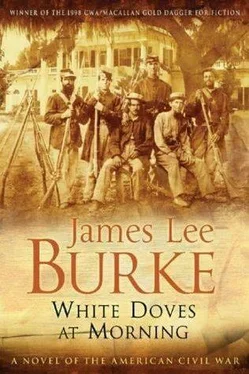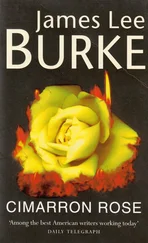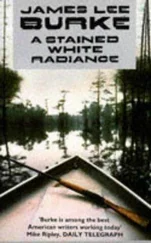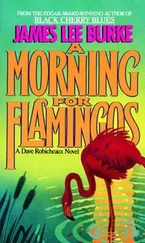Willie looked at the intensity in Jarrette's face, the heat that seemed to climb out of his buttoned collar, the twitch at the corner of one eye when he heard a convict's ax split a piece of green wood.
"Tell me, sir, is it possible you're insane?" Willie asked.
"Maybe. Anything wrong with that?" Jarrette replied.
"I was just curious."
Jarrette shifted his weight on his haunches and studied him warily. "Why you tearing down them newspaper stories? Don't lie about it, either," he said.
"They defame people I know."
Jarrette seemed to think about the statement.
"Cole Younger is my brother-in-law, you sonofabitch," he said.
Willie gathered up his plate and spoon from the grass, then reached down and picked up Jarrette's and returned them to the plank serving table under the canvas-topped pavilion. He walked back into the oak tree's shade. "As one Secesh to another, accept my word on this-" he began. Then he rethought his words and looked out at the wind blowing across the saw grass. "May you have a fine day, Captain Jarrette, and may all your children and grandchildren be just like you and keep you company the rest of your life," he said.
WHEN the sun was red over the cane fields in the west, Willie pulled the last copy of The Rebel Clarion article he could find from the front porch of a houseboat far down Bayou Teche and turned his horse back toward town.
Now, all he needed to do was bury his choke sack in a hole or set fire to it on a mud bank and be done with it.
But a voice that he preferred not to hear told him that was not part of his plan.
Since his return from the war he had tried to accept the fact that the heart of Abigail Dowling belonged to another and it was fruitless for him to pursue what ultimately had been a boyhood fantasy. Had he not written Robert the same, in the moments before he thought he was going to be shot, at a time when a man knew the absolute truth about his life and himself, when every corner of the soul was laid bare?
But she wouldn't leave his thoughts. Nor would the memory of her thighs opening under him, the press of her hands in the small of his back, the heat of her breath on his cheek. Her sexual response wasn't entirely out of charity, was it? Women didn't operate in that fashion, he told himself. She obviously respected him, and sometimes at the school he saw a fondness in her eyes that made him want to reach out and touch her.
Maybe the war had embittered him and had driven her from him, and the fault was neither his nor Abby's but the war. After all, she was an abolitionist and sometimes his own rhetoric sounded little different from the recalcitrant Secessionists who would rather see the South layered with ash and bones than given over to the carpetbag government.
Why let the war continue to injure both of them? If he could only take contention and vituperation from his speech and let go of the memories, no, that was not the word, the anger he still felt when he saw Jim Stubbefield freeze against a red-streaked sky, his jaw suddenly gone slack, a wound like a rose petal in the center of his brow-
What had he told Abby? "I'll never get over Jim. I hate the sons of-bitches who caused all this." What woman would not be frightened by the repository of vitriol that still burned inside him?
If he could only tell Abby the true feelings of his heart. Wouldn't all the other barriers disappear? Had she not come to him for help when she and Flower started up their school?
He tethered his horse to the ringed pole in front of Abby's cottage. The street was empty, the sky ribbed with strips of maroon cloud, the shutters on Abby's cottage vibrating in the wind. He walked into the backyard and set fire to the choke sack in Abby's trash pit, then tapped on her back door.
"Hello, Willie. What are you up to?" she said, looking over his shoulder at the column of black smoke rising out of the ground.
"A lot of townspeople were incensed at your being slandered by this Kluxer paper in Baton Rouge. So they gathered up the articles and asked me to burn them," he said.
"What Kluxer paper?" she said.
He stared at her stupidly, then yawned slightly and looked innocuously out into the trees. "It's nothing of consequence. There's a collection of cretins in Baton Rouge who are always writing things no one takes seriously."
"Willie, for once would you try to make sense?" she said.
"It's not important. Believe me. I was just passing by."
"You look like a boiled crab. Have you been out in the sun?"
"Abby, love of my heart, I think long ago I was condemned to a life of ineptitude. It's time to say good-bye."
Before she could reply he walked quickly into the side yard and out into the street.
Right into a group of seven mounted men, all of whom had either black or white robes draped over the cantles of their saddles. Each of the robes was sewn with an ornate, pink-scrolled camellia. In the middle of the group, mounted on a buckskin gelding, was the man whose colorless eyes had witnessed the burning of Lawrence, Kansas.
"You was sassing me today, wasn't you?" he said.
"Wouldn't dream of it, Captain Jarrette," Willie said. He looked up and down the street. There was no one else on it, except an elderly Frenchman who sold taffy from a cart and a little black girl who was aimlessly following him on his route.
Another rider leaned down from his saddle and bounced a picked camellia off Willie's face.
"It's the wrong time to be a smart ass, cabbage head," he said.
"Get about your business and I won't tell your mother the best part of her sunny little chap dripped into her bloomers," Willie said to him.
The man who had thrown the flower laughed without making sound, then wiped his mouth. He had black hair the color and texture of pitch and was tall and raw-boned, unshaved, with skin that looked like it had been rubbed with black pepper, his neck too long for his torso, his shoulders sloping unnaturally under his shirt, as though they had been surgically pared away.
He lifted a coiled rope from a saddlebag and began feeding a wrapped end out on the ground.
"You were one of the convicts on the burial detail that almost put me in the ground," Willie said.
"I wasn't no convict, boy. I was a prisoner of war," the tall man said. "You sassed the captain?"
The summer light was high in the sky now, the street deep in shadow. Willie looked between the horses that were now circling him. The yards and galleries of the homes along the street were empty, the ventilated shutters closed, even though the evening was warm.
"Where's a Yank when you need one?" the convict said.
"Get on with it," Jarrette said.
The convict tied a small loop in the end of the rope, then doubled-over the shaft and worked it back through the loop.
"You listen-" Willie began.
The convict whirled the lariat over his head and slapped it around Willie's shoulders, hard, cinching the knot tight. Before Willie could pull the rope loose, the convict wrapped the other end around his pommel and kicked his horse in the ribs. Suddenly Willie was jerked through the air, his arms pinned at his sides, the ground rising into his face with the impact of a brick wall. Then he was skidding across the dirt, fighting to gain purchase on the rope, the trees and picket fences and flowers in the yards rushing past him.
He caromed off a lamppost and bounced across a brick walkway at the street corner. The rider turned his horse and headed back toward the cottage, jerking Willie off his feet when he tried to rise. Willie clenched both his hands on the rope, trying to lift his head above the level of the street, while dust from the horse's hooves clotted his nose and mouth and a purple haze filled his eyes.
Then the convict reined his horse and was suddenly motionless in the saddle.
Читать дальше












